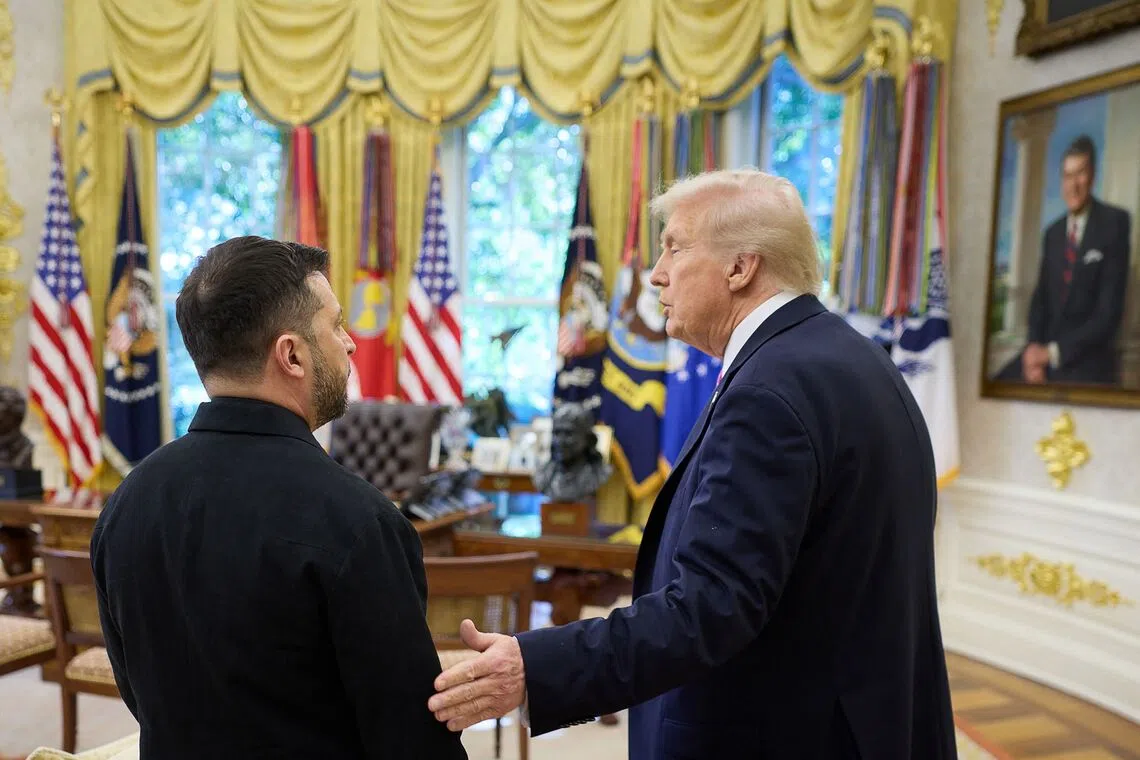Ukraine, US to start talks in Switzerland on Trump’s plan to end war
Sign up now: Get ST's newsletters delivered to your inbox

US President Donald Trump has given Ukraine less than a week to approve the 28-point plan to end the nearly four-year conflict.
PHOTO: AFP
KYIV - Ukraine and the US will soon meet in Switzerland to discuss Washington’s plan for ending the war with Russia, which currently heeds to some of Russia’s hardline demands, Kyiv said on Nov 22.
US President Donald Trump gave Ukraine less than a week to approve the 28-point plan to end the nearly four-year conflict, which would see the invaded country ceding territory, cutting its army, and pledging to never join NATO.
Meanwhile, Ukraine’s European allies, who were not included in drafting the agreement, were scrambling at the Group of 20 (G-20) summit in South Africa
“In the coming days in Switzerland, we are launching consultations between senior officials of Ukraine and the United States on the possible parameters of a future peace agreement,” Mr Rustem Umerov, who is on Ukraine’s negotiating team, wrote on social media.
“This is another stage of the dialogue that has been ongoing in recent days and is primarily aimed at aligning our vision for the next steps,” added Mr Umerov, a former defence minister, who is now the Secretary of Ukraine’s Security Council.
He previously led a few rounds of negotiations with Russia in Turkey, which yielded no breakthrough. This time, Ukrainian President Volodymyr Zelensky appointed his top aide, Mr Andriy Yermak, to lead the team, according to a presidential decree.
The decree said the talks will also include “representatives of the Russian Federation”.
There was no immediate confirmation from Russia whether it would join the talks.
Just peace
In a joint declaration, the G20 leaders called for a “just, comprehensive and lasting peace”, not only in Ukraine, but also in Sudan, the Democratic Republic of Congo and the “Occupied Palestinian Territory”.
French President Emmanuel Macron sent a sombre message to the gathering, saying “the G20 may be coming to the end of a cycle”, adding that the grouping was struggling to resolve major crises around the world.
He referred specifically to a new unilateral US plan to end the war in Ukraine that accepts some of Russia’s hardline demands.
Shortly before that, Mr Macron met German Chancellor Friedrich Merz and British Prime Minister Keir Starmer on the sidelines of the summit, boycotted by the US, to discuss a joint response to Washington’s plan.
Mr Starmer had earlier said the aim was to “look at how we can strengthen this plan for the next phase of negotiations”.
Difficult choice
Ukraine faces one of the most challenging moments in its history, Mr Zelensky said in an address to the nation, adding that he would propose alternatives to Mr Trump’s proposal.
“The pressure on Ukraine is one of the hardest. Ukraine may face a very difficult choice: either the loss of dignity or the risk of losing a key partner,” Mr Zelensky said in his address, referring to a possible break with Washington.
To end the war, the US plan envisages recognising territories controlled by Moscow as “de facto” Russian, with Kyiv pulling troops out of parts of the Donetsk region.
Ukraine would also cap its army at 600,000, rule out joining NATO and have no troops from the alliance deployed to its territory.
In return, Ukraine would get unspecified “reliable security guarantees” and a fund for reconstruction using some Russia assets frozen in foreign accounts.
Meanwhile, Russia would gain territory, be reintegrated into the global economy and rejoin the Group of Eight, according to a draft of the plan.
Russian President Vladimir Putin said the blueprint could “lay the foundation” for a final peace settlement, but threatened more land seizures if Ukraine walked away from negotiations.
Better equipped and larger in numbers, the Russian army is slowly but steadily gaining ground across the lengthy front line.
Ukrainians were meanwhile facing one of the toughest winters since the war began, after Moscow carried out a brutal bombing campaign against energy infrastructure.
This comes as a sweeping corruption probe that unveiled graft in the energy sector was unravelling in Kyiv, sparking public outcry. AFP


